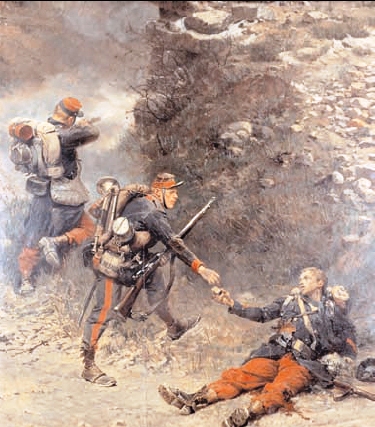Battle of Villiers on:
[Wikipedia]
[Google]
[Amazon]
The Battle of Villiers, also called the Battle of Champigny, was the largest of the French sorties from besieged Paris during the Franco-Prussian War.
 On 30 November
On 30 November
 Helmuth von Moltke, the Chief of Staff, was annoyed with the lack of energy which
Helmuth von Moltke, the Chief of Staff, was annoyed with the lack of energy which
Villiers
Leaders & Battles Database
Website of the Bry-sur-Marne's Museum
- Collections of the Museum Adrien Mentienne, related to the major events that occurred in Bry-sur-Marne, including the Battle of Villiers in 1870 (English version available) {{Use dmy dates, date=June 2017 Villiers, Battle of Villiers Villiers History of Val-de-Marne 1870 in France November 1870 events December 1870 events
Background
After news reached Paris of the French defeat at thebattle of Le Bourget
The Battle of Le Bourget was part of the siege of Paris during the Franco-Prussian War, fought between 27 and 30 October 1870.
Background
General Carey de Bellemare commanded the northern section of the Paris defenses, which, being in the vi ...
and the surrender of Metz, morale began to drop in the city. Attempting to counter the grim mood, General Louis Jules Trochu decided to attempt a breakout which could possibly link up with the French Army of the Loire
An army (from Old French ''armee'', itself derived from the Latin verb ''armāre'', meaning "to arm", and related to the Latin noun ''arma'', meaning "arms" or "weapons"), ground force or land force is a fighting force that fights primarily on ...
.
French attack
 On 30 November
On 30 November Auguste-Alexandre Ducrot
Auguste-Alexandre Ducrot (24 February 1817 – 16 August 1882) was a French general. Ducrot served in the Crimean War, Algeria, the Italian campaign of 1859, and as a division commander in the Franco-Prussian War.
At the outbreak of the Franco- ...
led 80,000 men towards the villages of Champigny and Bry on the east bank of the Marne River. This section of the German lines was held by the Württemberg Division of the Prussian 3rd Army. On the 29th the Marne had flooded and a French reconnaissance attack turned into a disaster; 1,300 troops were lost. The main attack was to come the next day followed by a series of diversionary attacks. French artillery drove German advance units from the villages of Bry and Champigny and allowed Ducrot's troops to cross the Marne on pontoon bridges. Ducrot established a bridgehead on the opposite bank of the river at the two villages and advanced up a plateau towards Villiers. The Württemberg Division was so well entrenched that the French artillery did little to dislodge them and the attack stalled. Ducrot called on his III Corps, which had crossed the Marne north of Brie, to assault Villiers from the north. The III Corps hesitated too long for an attack to be of any use and now Ducrot was fighting a defensive battle.
German counterattack
 Helmuth von Moltke, the Chief of Staff, was annoyed with the lack of energy which
Helmuth von Moltke, the Chief of Staff, was annoyed with the lack of energy which Albert of Saxony
en, Frederick Augustus Albert Anthony Ferdinand Joseph Charles Maria Baptist Nepomuk William Xavier George Fidelis
, image = Albert of Saxony by Nicola Perscheid c1900.jpg
, image_size =
, caption = Photograph by Nicola Persch ...
, commanding the Army of the Meuse, had shown in sending reinforcements to the Württemberg Division. Von Moltke ordered General Eduard von Fransecky to move with his II Corps 2nd Corps, Second Corps, or II Corps may refer to:
France
* 2nd Army Corps (France)
* II Cavalry Corps (Grande Armée), a cavalry unit of the Imperial French Army during the Napoleonic Wars
* II Corps (Grande Armée), a unit of the Imperial French ...
to the threatened area and assume command of all operations there. Fransecky however, had not been notified in time to do anything about the fight on the 30th. The two armies called a truce and buried their dead on 1 December.
On 2 December the Germans faced a similar situation to the battle of Le Bourget
The Battle of Le Bourget was part of the siege of Paris during the Franco-Prussian War, fought between 27 and 30 October 1870.
Background
General Carey de Bellemare commanded the northern section of the Paris defenses, which, being in the vi ...
. Fransecky did not feel that a counterattack was necessary since the main German line had not been broken yet; Albert pushed for a counterattack anyway, just as he had at Le Bourget. Fransecky's attack was so rapid that it quickly took Champigny. The French then rallied and a stalemate ensued for the rest of the day. The situation worried von Moltke enough to cause him to draw up plans in case the French renewed their attack the following day and succeeded in breaking through. However, Ducrot had no intention of renewing the fight. His troops had suffered greatly in the cold and even though he received word that the Army of the Loire was moving towards Paris, he withdrew back into Paris by 4 December.
Aftermath
The fighting had been costly for both sides. The French had lost over 9,000 troops while the Germans lost over 3,000. The Army of the Loire was defeated at the Battle of Orléans and Ducrot urged Trochu and Foreign Minister Jules Favre to sue for peace with Prussia.References
*Villiers
Leaders & Battles Database
External links
Website of the Bry-sur-Marne's Museum
- Collections of the Museum Adrien Mentienne, related to the major events that occurred in Bry-sur-Marne, including the Battle of Villiers in 1870 (English version available) {{Use dmy dates, date=June 2017 Villiers, Battle of Villiers Villiers History of Val-de-Marne 1870 in France November 1870 events December 1870 events